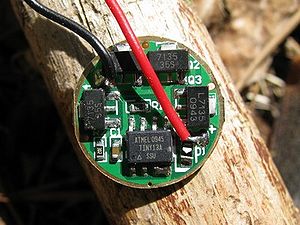Popular drivers: Difference between revisions
formatting |
|||
| Line 15: | Line 15: | ||
==Programmable Drivers== | ==Programmable Drivers== | ||
Some drivers, like the 112A, AK-47 and the 101-AK above have an Atmel Tiny13 chip on board. It is possible to reprogram this chip using AVR equipment and software to get not only exactly the number of modes and the light levels you want, but also to program the driver so the light has a programmable [[Terminology#UI|UI]]. More information [http://budgetlightforum.cz.cc/node/799 here]. | Some drivers, like the 112A, AK-47 and the 101-AK above have an Atmel Tiny13 chip on board. It is possible to reprogram this chip using AVR equipment and software to get not only exactly the number of modes and the light levels you want, but also to program the driver so the light has a programmable [[Terminology#UI|UI]]. More information [http://budgetlightforum.cz.cc/node/799 here]. See [[AVR Drivers]] to get some of the basics. | ||
==References== | ==References== | ||
<references/> | <references/> | ||
Revision as of 22:12, 3 April 2011
For a complete list of drivers, definitely check out the flashlight driver database and this CPF thread. But here are a few drivers from budget dealers that people have found useful when modding or upgrading flashlights. All of these drivers are 17mm (good for P60 drop-ins) and use a micro-controller and PWM for lower modes. For more about types of drivers, see Driver article.
NANJG 112A 0.9-4.2V 1000mA boost driver from KD with stars on the back that can be soldered to provide different modes. This model is no longer available. Supposedly buck/boost with an inductor. Seems well-regulated since current draw increases as voltage of li-ion decreases, but current draw declines with voltage on 1.2V NiMH. Works with AA or li-ion, but with 2xAA or 1xCR123A the low-voltage warning will cause flashing. 3-mode grouping has low and medium pretty close together. Review KD
NANJG AK-47 3x7135 2.6-4.5V 1000mA linear regulator. Two versions, one by DX (5-mode) and one by KD (2-mode) with unadvertised mode groups available. Both have stars on back that can be soldered for different groups. Modes are nicely spaced at 5, 30, and 100%. Efficiency is very high, 85-90% on High. DX recently shipped a AK-47C in the place of a different driver.[1] DX KD CPF Post Review of DX AK-47 Review of AK-47C

NANJG ROHS 101-AK 2.8-6V linear regulator. Two versions, one is a 3x7135 1050mAh driver with 3 (LMH), 5, or 7 modes selectable by clicky. Has room on board to add 4th 7135 chip for 1400mAh output DX or KD, but on at least one recent order the buyer received a NANJG AK47C with PIC chip instead. The other version of this driver is a 3-mode (LMH) version with 4x7135 on it already from Shining Beam with modes of 8%, 25%, and 100% with maximum output of 1400mAh. Review. KD sells a similar one marked 101-AK-A1 with 5 modes, but it can be set to 3 modes by soldering the two lower right legs together like the picture of the Shining Beam driver shows.
NANJG 105 8x7135 linear regulator driver advertised at KD as 1100mA, but is actually 2800mA. Runs off a single lithium-ion battery (which won't stay at 2.8A for long). Advertised as 5 modes, but has stars on the back similar to the other NANJG drivers that allow different groups of modes to be hardwired. At one time this was sold by Shiningbeam, but now they only sell the version below. KD. Some people ordering this driver from KD have been getting a similar 105A or 105C instead. Sometimes the 105A blinks after 2 seconds to indicate the mode has been saved to memory, but the others do not Review of 105A.
NANJG 106 Similar to the NANJG 105 above, but the 7135's on the bottom are laid out radially and lacks stars to set modes (it is set to 3 modes). Available at Shiningbeam.
Programmable Drivers
Some drivers, like the 112A, AK-47 and the 101-AK above have an Atmel Tiny13 chip on board. It is possible to reprogram this chip using AVR equipment and software to get not only exactly the number of modes and the light levels you want, but also to program the driver so the light has a programmable UI. More information here. See AVR Drivers to get some of the basics.